
Wong Kar-wai is a Hong Kong film director, screenwriter, and producer. His films are characterised by nonlinear narratives, atmospheric music, and vivid cinematography involving bold, saturated colours. A pivotal figure of Hong Kong cinema, Wong is considered a contemporary auteur, and ranks third on Sight & Sound's 2002 poll of the greatest filmmakers of the previous 25 years. His films frequently appear on best-of lists domestically and internationally.

In the Mood for Love is a 2000 romantic drama film written, produced and directed by Wong Kar-wai. A co-production between Hong Kong and France, it portrays a man and a woman in 1962 whose spouses have an affair together and who slowly develop feelings for each other. It forms the second part of an informal trilogy, alongside Days of Being Wild and 2046.

2046 is a 2004 romantic drama film written, produced and directed by Wong Kar-wai. An international co-production between Hong Kong, France, Italy, China and Germany, it is a loose sequel to Wong's films Days of Being Wild (1990) and In the Mood for Love (2000). It follows the aftermath of Chow Mo-wan's unconsummated affair with Su Li-zhen in 1960s Hong Kong and includes elements of science fiction.
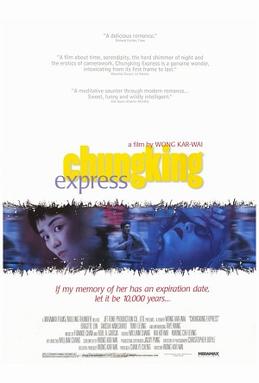
Chungking Express is a 1994 Hong Kong arthouse romantic comedy-drama film written and directed by Wong Kar-wai. The film consists of two stories told in sequence, each about a lovesick Hong Kong policeman mulling over his relationship with a woman. The first story stars Takeshi Kaneshiro as a cop obsessed by his breakup with a woman named May, and his encounter with a mysterious drug smuggler. The second stars Tony Leung as a police officer roused from his gloom over the loss of his flight attendant girlfriend by the attentions of a quirky snack bar worker.
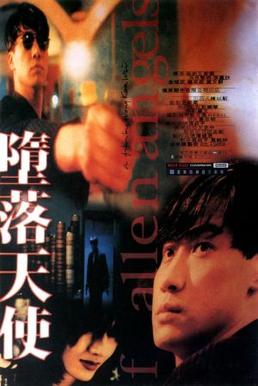
Fallen Angels is a 1995 Hong Kong neo-noir crime comedy-drama film written and directed by Wong Kar-wai. It features two intertwined storylines—one tells the story of a hitman wishing to leave the criminal underworld, the prostitute he starts a relationship with, and his agent, who is infatuated with him. The other story is of a mute ex-convict on the run from the police and a mentally unstable woman dumped by her boyfriend. Set in 1995 pre-Handover Hong Kong, Fallen Angels explores the characters' loneliness, their alienation from the situations around them, and yearning for connections in a hectic city.

Mishima: A Life in Four Chapters is a 1985 biographical drama film based on the life and work of Japanese writer Yukio Mishima, directed by Paul Schrader from a screenplay by his brother Leonard and Leonard's wife Chieko Schrader from a story by Paul Schrader and Jun Shiragi. The film interweaves episodes from Mishima's life with dramatizations of segments from his books The Temple of the Golden Pavilion, Kyoko's House, and Runaway Horses. Francis Ford Coppola and George Lucas were executive producers of the film, which has a musical score composed by Philip Glass and production design by Eiko Ishioka.

The Criterion Collection, Inc. is an American home-video distribution company that focuses on licensing, restoring and distributing "important classic and contemporary films". Criterion serves film and media scholars, cinephiles and public and academic libraries. Criterion has helped to standardize certain aspects of home-video releases such as film restoration, the letterboxing format for widescreen films and the inclusion of bonus features such as scholarly essays and documentary content about the films and filmmakers. Criterion most notably pioneered the use of commentary tracks. Criterion has produced and distributed more than 1,000 special editions of its films in VHS, Betamax, LaserDisc, DVD, Blu-ray and Ultra HD Blu-ray formats and box sets. These films and their special features are also available via The Criterion Channel, an online streaming service that the company operates.

Andrew Hui Chi-on is a Hong Kong singer and actor. Hui is considered one of the most successful Hong Kong singers, with an extensive list of Cantonese and Mandarin hits to his credit.
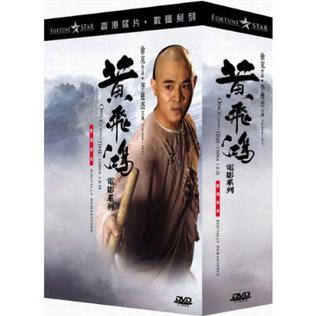
Once Upon a Time in China is a Hong Kong film and television franchise created and produced by Tsui Hark, consisting of six films and a television series released between 1991 and 1997. Tsui also directed four of the films and co-wrote the first five as well as an episode of the television series.

Iron Monkey is a 1993 Hong Kong martial arts film written and produced by Tsui Hark and directed by Yuen Woo-ping, starring Donnie Yen, Yu Rongguang, Jean Wang, Angie Tsang and Yuen Shun-yi. It is not related to the 1977 Hong Kong film of the same title.

Police Story 2, also known marketed as Police Story Part 2 is a 1988 Hong Kong action film starring and directed by Jackie Chan, who also wrote the screenplay with Edward Tang. It is a sequel to the hit 1985 film Police Story, continuing the storyline of Chan's character "Kevin" Chan Ka-kui, and is the second installment of Police Story series. It also marks the last appearance in the series for Lam Kwok-Hung as Chief Inspector Raymond Li, Chor Yuen as Chu Tao and Charlie Cho as John Ko.

Bad Timing is a 1980 British psychological drama film directed by Nicolas Roeg and starring Art Garfunkel, Theresa Russell, Harvey Keitel and Denholm Elliott. The plot focuses on an American woman and a psychology professor living in Vienna, and, largely told through nonlinear flashbacks, examines the details of their turbulent relationship as uncovered by a detective investigating her apparent suicide attempt.

Michael Wong Kong Leong, also known mononymously by his Chinese name Guang Liang, is a Malaysian Chinese singer and composer who has sung and written many love-themed ballads and love songs, many of which have high popularity. He is popularly known in the Mandopop scene as the "Prince of Love Songs" (情歌王子).

Edward Yang was a Taiwanese filmmaker. He rose to prominence as a pioneer in the Taiwanese New Wave of the 1980s, alongside fellow auteurs Hou Hsiao-hsien and Tsai Ming-liang. Yang was regarded as one of the leading filmmakers of Taiwanese cinema. He won the Best Director Award at Cannes for his 2000 film Yi Yi.

A Touch of Zen is a 1971 wuxia film written, co-edited and directed by King Hu. Its screenplay is based on a classic Chinese story "Xianü" in the book Strange Stories from a Chinese Studio by Pu Songling. The film is set in the Ming dynasty under the dominance of eunuchs and explores a variety of themes including the transcendence of dichotomies, Zen Buddhism, feminism, conservative female roles, and the ghost story.
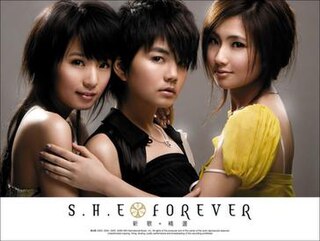
Forever is Taiwanese Mandopop girl group S.H.E's second compilation album and 9th album overall. It was released on 21 July 2006 by HIM International Music.
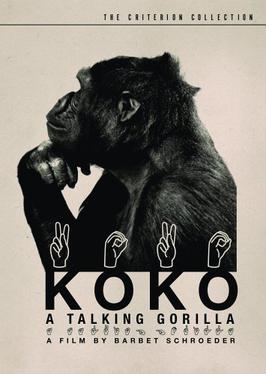
Koko: A Talking Gorilla is a 1978 French documentary film directed by Barbet Schroeder that focuses on Francine Patterson and her work with Koko, the gorilla. Patterson claims to have taught Koko to communicate with humans using symbols taken from American Sign Language. The film was screened in the Un Certain Regard section at the 1978 Cannes Film Festival.
Antony Rayns is a British writer, commentator, film festival programmer and screenwriter. He wrote for the underground publication Cinema Rising before contributing to the Monthly Film Bulletin from the December 1970 issue until its demise in 1991. He has written for the British Film Institute's magazine Sight & Sound since the 1970s, and also contributed extensively to Time Out and to Melody Maker in the late 1970s.

Hedwig and the Angry Inch is a 2001 American musical comedy-drama film written for the screen and directed by John Cameron Mitchell. Based on Mitchell's and Stephen Trask's 1998 stage musical Hedwig and the Angry Inch, it accompanies Hedwig Robinson, a gay East German rock singer. Hedwig subsequently develops a relationship with a younger man, Tommy, becoming his mentor and musical collaborator, only to have Tommy steal her music and become a rock star. The film follows Hedwig and her backing band, the Angry Inch, as they shadow Tommy's tour, while exploring Hedwig's past and her forced sex reassignment surgery. Mitchell reprises his role as Hedwig from the original production.
Al Kuan is a Malaysian music producer, recording engineer, songwriter, copyright manager, A&R, columnist, and artists agent.

















